- Home
- Steven Brust
The Skill of Our Hands--A Novel Page 3
The Skill of Our Hands--A Novel Read online
Page 3
I nodded. “Just Carter. You must be Miss Voight.”
“Susan, please,” she said, and shook my hand like a man. I must have looked a little startled at the offer of familiarity, because she said, “As a courtesy to your friend Oskar, who has never even told me his patronymic. I think it’s a small form of rebellion for him.”
* * *
It’s more complicated than that, but I don’t want to go into it.
—O
* * *
I nodded and suppressed a smile.
“Have you found accommodations?” Her British accent was unmistakable, but some of its precision had been worn away by her stay in America.
“Yes,” I said. “The Briggs House. There are finer hotels here than I’d thought there would be. I imagine in the East we think of the West as more universally rustic than it is.”
“But not more muddy,” she said with a quirk of her lips and a glance at my boots. “Please sit.”
I did, matching her body language and expression. She relaxed a little.
“I admire your work,” I told her. “I’ve been reading your articles. Powerfully reasoned and passionate.”
She nodded. “What is your involvement?”
“Less than yours. My work often brings me south of Mason-Dixon, especially to New Orleans. I do what I can to convince the overseers to be a bit less brutal. When I’m in the north, I interfere with the slave-catchers.”
She shook her head. “As long as the institution itself survives, such measures are quite nearly pointless.”
“I agree,” I said. I was a lot more effective in my meddling than she had any way of knowing, but she was still right. “The question is, can we succeed?”
“In ending slavery? Not peacefully, I’m afraid. The slave power won’t surrender without a fight.”
“So, you’re gathering armies? If there’s to be violence—”
“No.”
“What then?”
“You’ve read my articles.” She reminded me a little of Oskar: always convinced that Great Events were just around the corner, in spite of all evidence to the contrary. Yet that comparison somehow made me like her.
“You think John Fremont has a chance?” I asked.
“I don’t know. But he’s worth supporting. He’s more easily elected than Seward or Chase, and wresting control of the Federal Government from the slave power is the next step.”
I nodded. Oskar had convinced me of that much, anyway. “Free soil, free labor, free men, Fremont. If he wins the nomination, it’ll make a good campaign slogan.”
“You left out ‘free speech.’ In the deep south, and in Kansas, it is illegal to suggest human beings ought not to be chattel. They can imprison you for saying it.”
“If he’s elected, they’ll never let him take office.”
“If they try to stop him, they’ll rouse the whole North. Even more if they attempt to secede.”
I had severe doubts about the North’s willingness to be roused—too many of them were happy and satisfied. There had been no ’48 on this side of the ocean because we Yankees didn’t go in for that sort of thing. “The South will never secede,” I said. “They’ll just threaten until the North caves in again.”
“Mr. Carter, in your letter, you said you wanted my advice. About what?”
“Where?”
Her brows came together. “Where what?”
“Where can I do the most good?”
She hesitated. I could see what she saw: a frail-looking old man who might not survive anything rigorous. Then she almost nodded to herself, and apparently decided that I had to make that decision myself. “Kansas,” she said.
“I was afraid you’d say that.”
“It isn’t merely Kansas by itself, and whether it’s free soil. Right now the fight for Kansas is the key to everything else. We can lose the battle and win the war, or win the battle and lose the war. Right there, in Kansas.”
“Which means how we fight is as important as the result?”
“More important.”
“All right then, I’ll go.”
“Good. The thing to remember is that it may take guns to protect yourselves, but guns aren’t how we need to win this. We need to win the heart of the North.”
“I know.”
“Do you think you can convince the settlers of that?”
“We’ll see,” I said. “I can be very convincing.”
THREE
What Brings You to Town?
At a desk in the Toronto Public Library, Research and Reference Division, Takamatsu Toshitsugu stopped reading the Incrementalists forum, controlled his breathing, and let calm wash over him.
Phil was in stub.
It wasn’t the first time Phil had died, nor was it likely to be the last. But effectively, for now, there was no Phil. The Incrementalists were an unevenly weighted three-dimensional pendulum with no pivot. We have halted, our own weight straining against us.
He felt himself frowning. Why did I just think that?
What was happening now that made Phil’s death especially troublesome for the group? There must be something, because when such thoughts formed in his head, Takamatsu had learned to trust them. So what was it? What pattern had his subconscious mind detected?
Takamatsu considered what he knew.
There were many things the Incrementalists didn’t understand about the process of death, stub, and Second, but they knew this much: while in stub, there is no “you.” You exist as potential. Not a person, not a being, but something that could become one. Sometimes it could feel like you had consciousness in stub, but that’s because the process of entering stub—dying—and the process of coming out of stub—spiking—bring with them floods of disorganized memories. It is as if you are incapable of dreaming, but your thoughts before falling asleep and just upon waking combine to convince you you have dreamed.
Takamatsu reconsidered. Yes, Celeste had shaded, but she had still managed to secrete some of her memories away from Ren, who had gotten her stub. Takamatsu did not believe any remnant of Celeste—not her pattern nor agenda nor even her metaphorical thread—remained in the Garden as a threat to Phil, his stub, or the larger organization. Only perhaps her absolute conviction had any power to outlive her in their collective, distributed imagination.
Takamatsu turned his attention to what he did not know.
Jimmy would be flying to the support of Ren as quickly as he could, Takamatsu was certain. But Oskar? Irina? Ramon? He didn’t know. And how had Phil died, for that matter? He was young and in good health. Something must have happened.
Ren was the key. An Incrementalist for only three years, one of their newest in love with their oldest, untested but central. Axial, but thought herself a tangent. She could crumble and trigger a collapse, or she could bear up under the strain and become something new, a pivot, and that was where a touch—gentle, embrocating—might be needed.
Takamatsu prepared to enter his Garden to look for patterns.
* * *
Oskar made it to the hospital in under ninety minutes, no meddling required until he reached the ER waiting room.
He considered how many of the dozen or so people waiting there would be bankrupt in a year because of what happened today, then he mentally shook his head. Not now. Ren wasn’t in the waiting room, and the nurse at the triage desk had the withdrawn look that indicated someone hard to meddle with without switches. Oskar could be very convincing, but it would take more time than he wanted to spend to get the nurse to tell him where Ren was.
He studied the people waiting again. One, an attractive, dark-haired soccer mom, was reading from her phone. Her hands were still and relaxed, and she was absorbed in her reading, so it wasn’t her children, her parents, or a sibling she was waiting for; and if it was her husband they should have split up years ago. There was a little tension in her back, so it was actually someone she cared about, and it was something serious, a big “yes” or “no” she was waiting for.
And when she looked up, her eyes went toward the doors that obviously went toward the consultation rooms. Clearly, she wasn’t with a patient, she was with someone who was with a patient.
Oskar approached her. “Pardon me,” he said. “I’m looking for Renee Mathers. Do you know her?”
The woman jumped a little, nodded, then frowned. “How did you know?”
“I was going to ask everyone in the room; just got lucky and asked you first.”
“Some guy came and got her about twenty minutes ago.”
“Has he come back out?”
“I think so. I wasn’t watching closely. I don’t really know her. We just met—”
“Thank you.”
Oskar ducked into his Garden long enough to check the hospital architecture and learn that the consulting rooms were labeled by number rather than letter—about ten seconds. Then he went up to the triage nurse, pitched his low voice lower, added a light overlay of boredom, and said, “Mathers, Renee. Consulting two. Grief Counseling. Buzz me in.”
The nurse gave him a quick glance, then did.
Oskar found Ren in Consulting three. She looked at him, her freckles too stark against her normally dark skin. She stood up, and he put his arms around her. “We’ll get him back,” he said. “I promise, we’ll get him back.”
“You can’t know that,” she said into his shirt.
“I know,” he said. “As sure as I’ve ever known anything.”
Ren’s shoulders shook as she cried.
* * *
Irina pulled into the parking lot on the far side of Sir Vezas’s Taco Garage and popped the Miata’s trunk. From the tackle box labeled FACE AND HAIR she selected an iridescent butterfly clip, and from the SMELLS AND TASTES box she took a piece of blue Juicy Fruit gum and popped it into her mouth. She chewed it, working the taste of Jack Harris’s first girlfriend’s kisses into her mouth, wishing she knew why the assistant police chief had summoned her. His texts had been urgent but vague. He needed to see her. He had bad news.
Irina chewed the Juicy Fruit and fretted over whether to smell like Bisquick or sweat. She had no way of knowing whether Jack would need maternal comfort or simple friendship. Either way, he was a highly trained police detective, adroit as any Incrementalist at reading people, and Irina knew she was visibly nervous. It was okay, she reminded herself, she had good reason to be. She was worried about him.
She was worried about what his bad news was too—it could be very bad. But even that worry would be okay for Jack to notice. What he mustn’t pick up on was any indication that Irina was recording it. She adjusted the butterfly, its cylindrical body battery-warm and heavy, and decided against an olfactory switch. She opened another button on her blouse instead. Breasts were marvelously multipurpose.
On the other side of the restaurant, beyond the Dumpster, Jack Harris was waiting for her in the stingy shade of a single scrubby tree. “Hi yo, Kimo Sabe!” he greeted her without taking his bandy shoulders or his booted foot off the trunk he leaned against.
Irina gave the Juicy Fruit a final chomp, and swallowed the gum. “Hi yo, Silver!” she responded, leaning in to kiss the blue taste of innocence onto his lips.
Assistant Police Chief Harris had almost no upper lip and hair that had retreated dramatically and in a uniform line across the top of his head, leaving him with a shining knife blade of close-cropped silver haloing his elongating forehead. He rarely lied, never swore, and he only cheated on his wife to spare her their badly matched libidos. He gripped Irina’s hips in squat, capable hands and pulled her closer. “Thanks for coming all the way out here, baby.” He contracted his eyebrows into a deliberate frown, but displeasure didn’t reach as far as his eyes. Something strange was going on.
“Anything for you.” Irina hadn’t intended to care for this blunt man with his clean hands and monochrome morality. But by the time she knew enough about anyone to meddle well, she was almost half in love. Jack Harris was a cop, and a brutal one, and exposing him would break her heart, and she would have to let it be broken. “What’s the bad news?” she asked.
Jack chuckled and kissed her Juicy Fruit mouth. He kissed her slowly, without artifice or nuance, but Irina couldn’t relax. “What happened, Jack?”
Jack’s crooked grin split his face. “Aw, I was just having a little fun with you. There’s nothing wrong. Matter of fact, today’s turned out top shelf.”
“Yeah?” Adrenaline surged through Irina’s body, but she forced herself to stay pliant in the chief’s strong hand, her hair clip close to his chin. “Are you going to tell me about it now since I’ve come all the way out here?” Irina slid her hands under Jack’s coat, and around his waist where he sagged and pooched a little over his belt. She loved the places his skin felt thin where the muscle under it had cured and hardened from meat into wood, deliciously tested and enduring, but something kept her from reaching his hard, bare shoulders under his shirt. Irina realized what she’d touched and recoiled several steps. “Jack!”
He shrugged. “I’m here with the guys. I couldn’t take my coat and holster off just to go out for a smoke.” He held out his hands to her again. “Come here.”
Irina shook her head, remembering her old .38 in Phil’s hand, the impact and cold pain of being shot. Guns were a switch for her now. Go figure.
“Ah, come on, my wild Indian,” he coaxed. “I’ll tell you my news.”
Vanessa Surya, whose body Irina had gotten after Phil shot her, had been born in Jakarta, but Jack wasn’t the sort to know Indian from Indonesian. His crooked grin crinkled one cheek. “They got him.”
Irina froze. “Who? Who got who?”
“That guy I’ve been telling you about, the one making trouble for my rangers, someone shot him.”
Irina managed to morph the starting sound of Phil’s name into a low “Fuck.”
“Yup.” Jack beamed. “Chopped the head clean off that damn snake.”
“Is he…”
“Don’t know yet. They’ve got him at UMC.” Jack shrugged his hard shoulders. “I say let him die. I would have shot him myself, if I’d got the chance.”
“You could have done that? Looked an innocent man in the eyes and pulled the trigger?”
“For the good of my country? Hell yeah, I could have. And this guy wasn’t innocent, not by a long sight. He’s been stirring up all kinds of shit. I was saving it for a secret, but we had a raid planned for Sunday.” Jack grinned and pulled Irina against him. “I promised you baby, I always get my man. And weren’t you the one always telling me about sins of omission and all that?”
“I was talking about having him arrested.” Irina reeled with shock and not wanting to touch him. “Do you know who shot him?”
The sapphire barrel of Jack’s blue eyes contracted around their pupils’ black bore. “Probably a rival vigilante group,” he said. His eyes dropped to Irina’s chest. “One of Tanton’s guys, or Taylor’s,” he told her breasts. “That’s how it goes. Some liberal dropping off water in the desert, running a frickin’ underground railroad, slashing the tires of enforcement vehicles. Another crazy shoots him. I say good riddance.” Irina nodded. The only flicker of guilt Irina had seen came when Jack had named his suspects. “Arrest anyone yet?” she asked.
“Nah.”
“Are you going to?”
“Come here.” Jack’s thin lips brushed Irina’s throat like spider feet. “God, you smell good enough to eat. We’ll run a watered-down version of our sting op on Sunday just to mop up.”
“But not to catch whoever shot Ph— Fucking Snake Head Guy.”
Jack grunted and his lips crawled up Irina’s neck. She turned her mouth to his, wishing she’d gone with music instead of kissing. Irina always went with touch. It was more effective than any of the senses except maybe smell, and it cut both ways. It made it seem fairer, less manipulative, somehow, to let the people she worked on work on her.
Still, right at the moment, Irina wished to God she had gone with music. Toy Caldwell wa
iling “Can’t You See” would make her assistant police chief wistful as easily as Juicy Fruit kisses would. Jack wasn’t a man to stand for anything less than a girl’s full attention, but it was Ren, who’d need food for the hordes descending to help her, that Irina kept thinking about. But there was so much Irina needed to take care of. She’d need to meddle Menzie into breaking the story on his blog soon enough to cancel Jack’s mop-up raid, which meant picking a place to meet him and hiring a couple of extras. And she had to find a way to warn the kids and immigrants who comprised the sinuous vertebrae of Phil’s subversive snake.
Beheaded.
The thought of Phil dead sent a shudder through Irina, and Jack chuckled, flattering himself. Phil was going to be so pissed about this. Not to mention Oskar. Phil’s face materialized before Irina’s closed eyes as he’d looked the last time she’d seen him—angry and cold and pointing a gun right at her. It didn’t seem possible he could be dead.
“You’re sure they shot the right guy?” Irina asked her chief. “Your guy?”
“Absolutely. Chuck Purcell, the meddling son of a bitch.”
* * *
Kate was late to pick up the kids again, darn it all, and traffic wasn’t cooperating. It was ten minutes from her house to the school if she timed the lights right. Half hour should have been plenty of time to just pop onto the forum and see why Oskar needed her to send a scrip for sleeping pills in to Ren’s pharmacy, but gracious, what a mess!
Phil was dead and in stub in the Garden. It wasn’t like they didn’t know what to do about that, but everyone was posting and leaving comments, even the folk with nothing to say. Well, Phil was a pivot at the best of times, which these weren’t. He was also the oldest and the most incremental of them all. Some might argue Celeste had been even more incremental; and sure, if she could have, she would have stopped them meddling entirely just on principle, but wasn’t that the definition of an extremist? It was the opposite of Oskar, anyway, and he was radical as surely as Kate was late, and Kate was late before she left the house.

 Phoenix
Phoenix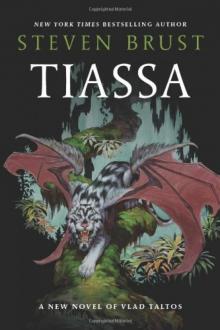 Tiassa
Tiassa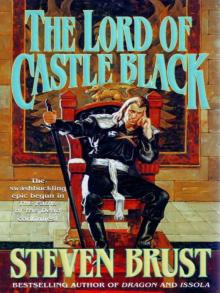 The Lord of Castle Black
The Lord of Castle Black To Reign in Hell: A Novel
To Reign in Hell: A Novel Five Hundred Years After (Phoenix Guards)
Five Hundred Years After (Phoenix Guards) The Book of Dzur: Dzur ; Jhegaala
The Book of Dzur: Dzur ; Jhegaala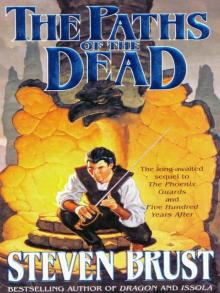 The Paths of the Dead
The Paths of the Dead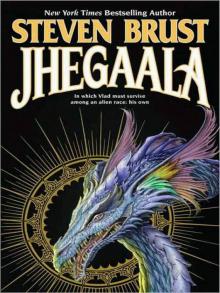 Jhegaala
Jhegaala The Desecrator: A Tor.com Original
The Desecrator: A Tor.com Original Agyar
Agyar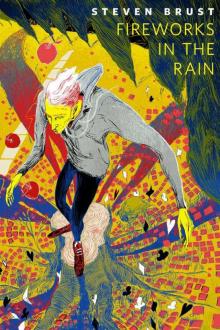 Fireworks in the Rain
Fireworks in the Rain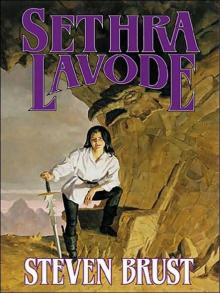 Sethra Lavode
Sethra Lavode The Book of Athyra
The Book of Athyra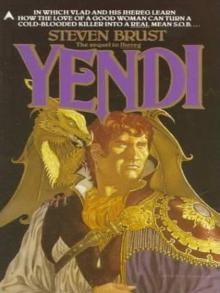 Yendi
Yendi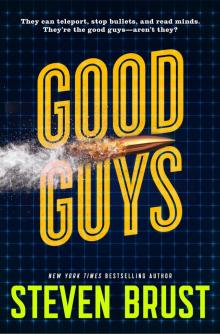 Good Guys
Good Guys The Book of Jhereg
The Book of Jhereg Cowboy Feng's Space Bar and Grille
Cowboy Feng's Space Bar and Grille Sethra Lavode (Viscount of Adrilankha)
Sethra Lavode (Viscount of Adrilankha) My Own Kind of Freedom
My Own Kind of Freedom Dzur (Vlad Taltos)
Dzur (Vlad Taltos) The Lord of Castle Black: Book Two of the Viscount of Adrilankha
The Lord of Castle Black: Book Two of the Viscount of Adrilankha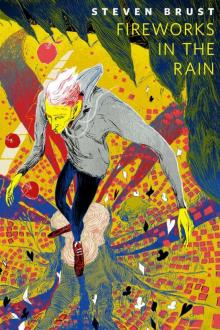 Fireworks in the Rain: A Tor.Com Original
Fireworks in the Rain: A Tor.Com Original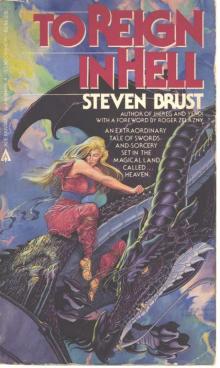 To Reign In Hell
To Reign In Hell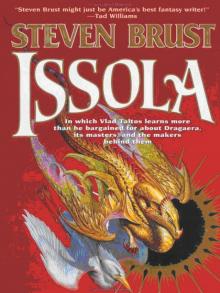 Issola
Issola Orca
Orca Issola (Vlad Taltos)
Issola (Vlad Taltos)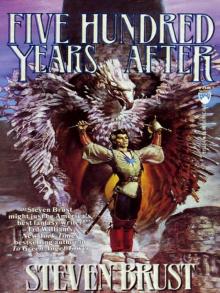 Five Hundred Years After
Five Hundred Years After The Phoenix Guards
The Phoenix Guards Taltos
Taltos![[Vlad Taltos 06] Athyra Read online](http://i1.bookreadfree.com/i1/03/24/[vlad_taltos_06]_athyra_preview.jpg) [Vlad Taltos 06] Athyra
[Vlad Taltos 06] Athyra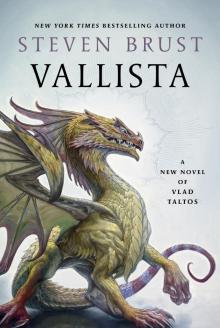 Vallista--A Novel of Vlad Taltos
Vallista--A Novel of Vlad Taltos The Incrementalists
The Incrementalists![[Vlad Taltos 04] Taltos Read online](http://i1.bookreadfree.com/i/03/24/[vlad_taltos_04]_taltos_preview.jpg) [Vlad Taltos 04] Taltos
[Vlad Taltos 04] Taltos![[Vlad Taltos 03] Teckla (v 1.1) Read online](http://i1.bookreadfree.com/i1/03/27/[vlad_taltos_03]_teckla_v_1_1_preview.jpg) [Vlad Taltos 03] Teckla (v 1.1)
[Vlad Taltos 03] Teckla (v 1.1) The Book of Taltos
The Book of Taltos The Paths of the Dead (Viscount of Adrilankha)
The Paths of the Dead (Viscount of Adrilankha) Jhegaala (Vlad Taltos)
Jhegaala (Vlad Taltos)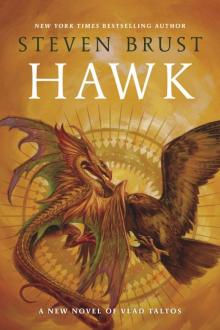 Hawk (Vlad)
Hawk (Vlad) Iorich
Iorich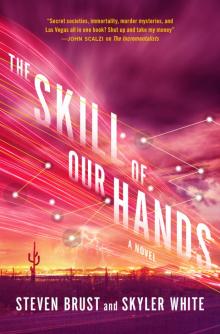 The Skill of Our Hands--A Novel
The Skill of Our Hands--A Novel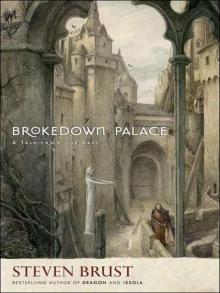 Brokedown Palace
Brokedown Palace Dragon (Vlad Taltos)
Dragon (Vlad Taltos) Dragon
Dragon Athyra
Athyra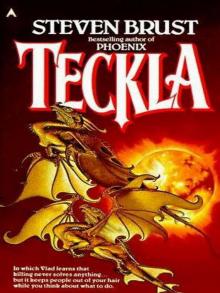 Teckla
Teckla Dzur
Dzur